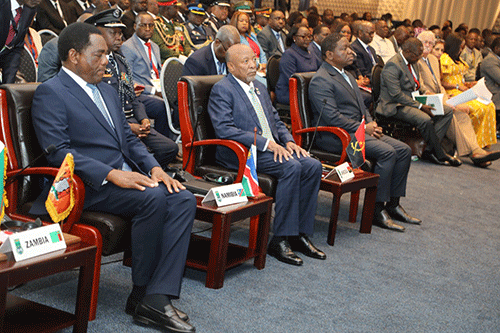LIVINGSTONE – President Nangolo Mbumba has heaped praise on Namibia’s conservation efforts, saying they are rooted in a community-based wildlife conservation strategy.
The strategy, has helped the country unlock the vast potential of its natural resources as a means of empowering local communities.
“We are grateful and proud of this achievement,” Mbumba told over 700 delegates on Friday during the just-ended five-day Kavango-Zambezi Transfrontier Conservation Area (KAZA TFCA) summit in Livingstone, Zambia.
Importantly, he highlighted that the local community-based institutions referred to as conservancies in turn help to manage Namibia’s natural resources at the grassroots level, in collaboration with the government.
“Through legislation, communities that form conservancies gain management rights over wildlife and tourism concessions in our national parks. Thus, they can use these management rights to develop economic opportunities such as eco-tourism and hunting. Subsequently, these opportunities provide income and jobs for members of communities in some of the poorest areas of the country,” Mbumba said.
Consequently, communal farmers become direct participants in the conservation and rural development processes, from which they are now able to derive direct income through wildlife and tourism activities.
Procedurally, all the revenue generated from trophy hunting is channelled to rural communities through conservancy programmes.
Mbumba pointed out that Namibia has observed an increase in capacity within conservancies to manage wildlife and develop wildlife-based economic activities.
Furthermore, the country has seen the creation of jobs and the generation of revenue in areas where communities previously only relied on subsistence farming.
“We have seen how local communities, through holistic integrated wildlife management, have started to complement other forms of land use,” stated the President. Despite the milestones Namibia has achieved in wildlife management, the President stressed that illegal hunting, especially that of elephants and rhinos, continues to be a thorn in the flesh.
To nip illegal hunting and poaching in the bud, he said there is an urgent need for the government and communities to work together to strengthen measures for crime prevention to protect wildlife.
Namibia’s conservation programme comprises of 86 registered conservancies and 43 community forests, covering 180 083 square kilometres and over 227 802 residents.
Within the context of KAZA, the head of State said Namibia is actively participating in various efforts coordinated by the KAZA secretariat to disrupt the illegal wildlife trade and poaching.
Mbumba then called upon partner countries to allocate adequate human and financial resources to attain the goals and objectives of KAZA.
The first-ever summit brought together heads of state and senior government officials representing KAZA membership, namely Namibia, Zambia, Angola, Zimbabwe and Botswana.
It was aimed at reviewing and tracking the progress made since the establishment of the KAZA TFCA in 2011.


